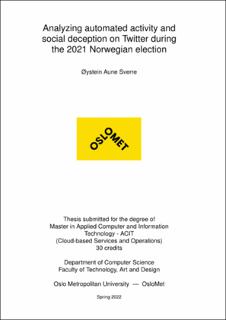| dc.description.abstract | The growing concern of fake news and social bots as threats to democracy leaves society with motivation to investigate and research its presence. In this thesis, we look into social bot research and try to understand the current landscape and its caveats, including its reliance on closed-source tools such as Botometer for bot detection. A Twitter data set is created, consisting of political Tweets made during the 2021 Norwegian election. A variety of techniques, such as manual inspection, plagiarism, exploratory data analysis, and Botometer scores are used to investigate the presence of automated activity and social bots. In the course of this thesis we find no concrete evidence of disguised automated activity or social bot presence, and discover multiple inconsistencies in the Botometer classification results. An argument is made for research to rely less on closed-source tools and resort to more reliable ways to investigate and understand social bots. | en_US |
